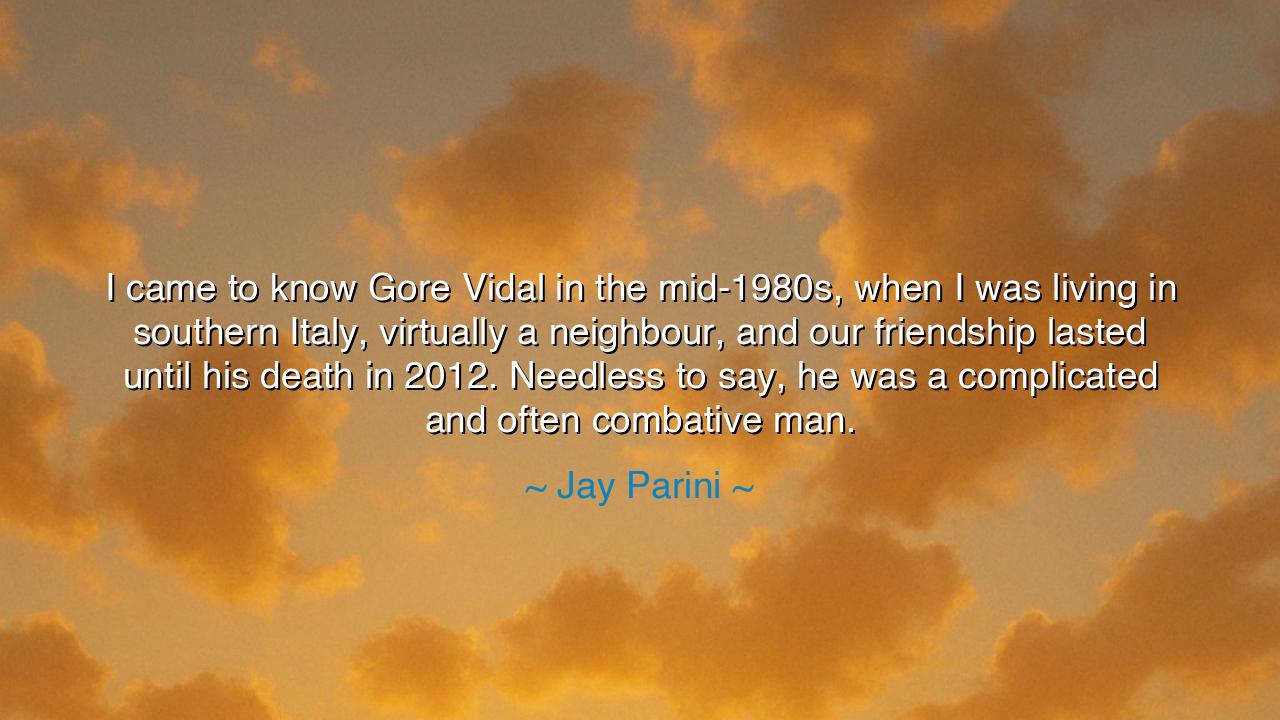
I came to know Gore Vidal in the mid-1980s, when I was living in
I came to know Gore Vidal in the mid-1980s, when I was living in southern Italy, virtually a neighbour, and our friendship lasted until his death in 2012. Needless to say, he was a complicated and often combative man.






"I came to know Gore Vidal in the mid-1980s, when I was living in southern Italy, virtually a neighbour, and our friendship lasted until his death in 2012. Needless to say, he was a complicated and often combative man." These words from Jay Parini speak to a truth about friendship, one that is formed not from simplicity, but from the collision of personalities, the friction of differing beliefs, and the complex forces that drive two people together. Gore Vidal, a man known for his sharp tongue and biting intellect, was a figure who did not lend himself to easy alliances. His complicated nature made him both a formidable companion and a challenging adversary. And yet, Parini’s words remind us that true friendship often arises not in the midst of smooth sailing, but in the turbulent waters where contrasting views meet and form something far deeper than mere agreement.
To speak of Vidal is to speak of a man who was often at odds with the world around him. Known for his wit, his irreverence, and his bold critique of the establishment, he was both adored and despised. He was a polarizing figure, whose intellect often clashed with the norms of his time. Yet, it was precisely in this combative spirit that his friendship with Parini flourished. Friendship, as Parini reveals, does not require harmony at all times; it requires mutual respect even in the midst of disagreement. Vidal and Parini, though likely differing on many matters, found in each other a bond strong enough to withstand the test of time. It was in their shared respect for intellect and their capacity for honest dialogue that their connection grew.
Consider the example of the ancient Greek philosophers, such as Socrates and Plato, whose relationships were not built on mere camaraderie but on a shared pursuit of truth—and often, that pursuit meant clashing with one another. Socrates was known for his probing questions and his relentless challenge to his peers, seeking not to please but to provoke thought. Plato, though a follower of Socrates, often disagreed with his teacher, and yet, their bond was one of the most significant in the history of Western philosophy. Their differences did not destroy their relationship; rather, they strengthened it. True friendship, then, is not the avoidance of conflict, but the ability to engage with others in a way that promotes growth, understanding, and a deepening of one’s own character.
In the same vein, Parini’s relationship with Vidal can be seen as a modern-day reflection of this ancient ideal. To be in friendship with a man like Vidal, whose intellect was as sharp as a sword and whose opinions were often delivered with the force of a battle cry, required patience, fortitude, and above all, a commitment to honesty. In Vidal, Parini found not a mere friend, but a challenge, a person who pushed him to think more deeply, to question more thoroughly, and to embrace the complications of the human experience. It is easy to seek out friendships with those who share our views, but true companionship arises when we engage with those who force us to examine our own assumptions and beliefs.
The lesson here is one of great significance: friendship does not require us to agree, nor does it demand that we avoid difficult conversations. On the contrary, the best friendships often arise when two individuals with vastly different perspectives choose to stand together in mutual respect, even when their views are at odds. Vidal was no easy companion—his life was marked by a certain combative spirit, yet it was that very spirit that made his friendship with Parini so rich. Their bond was not founded on surface-level pleasantries, but on a deep and abiding recognition of the other’s humanity. In their friendship, they shared honest exchanges, often challenging one another, yet always returning to a place of mutual respect.
In our own lives, we too must learn to embrace the complicated friendships that come our way. It is far too easy to seek out people who simply agree with us, who echo our thoughts and affirm our beliefs. But the friendships that truly nourish us are those that challenge us, those that provoke thought and force us to see the world through a different lens. It is in these relationships that we find the greatest growth—growth not just as individuals, but as human beings capable of seeing beyond the narrow confines of our own experience.
Therefore, the practical lesson is to seek out those friendships that may not always be easy, but that are grounded in respect, intellectual honesty, and a shared desire to grow. Just as Parini and Vidal formed a bond despite their differences, so too should we embrace the difficult yet rewarding friendships that come our way. Engage deeply with others, especially those who challenge you, for it is through these interactions that we become the best versions of ourselves. Friendship, in its highest form, is a meeting of minds, not necessarily in agreement, but in a shared commitment to the truth, whatever that truth may be.






AAdministratorAdministrator
Welcome, honored guests. Please leave a comment, we will respond soon